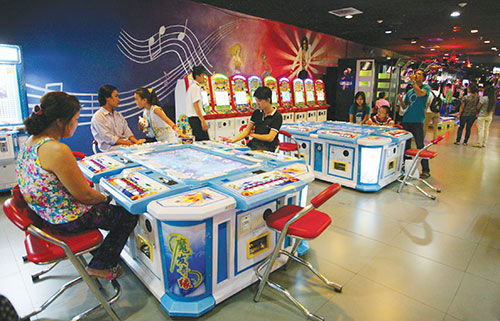Licenced gaming tightened

A new decree will narrow the faclities entitled to offer electronic gaming servicesPhoto: Le Toan
The governmental Decree 86/2013/ND-CP, dated July 29, stipulated that all 5-star or equivalent hotels and resorts were free to open electronic gaming services as long as they are in a separate facility and satisfy security requirements. This also means hospitality businesses with less than five stars would no longer be allowed to operate such services.
The new decree replaced Decision 32/2003/QD-TTg, issued almost a decade ago, which was the only legal framework regulating electronic gaming service providers. According to the Ministry of Finance (MoF), the new guidelines were much needed as the old policy was archaic and a decision was not comprehensive enough to manage such a complex business.
The new decree however does not include the operations of casinos, only electronic gaming machines.
Decree 86 is unchanged regarding the prohibition of Vietnamese from entering gaming facilities, but it is a significant step forward in the development of the gaming industry.
“We are very pleased with the new decree, as it shows the Vietnamese government is taking the gaming business seriously and protecting both people and businesses with an appropriate legal framework. From what we understand, the government intended to start with electronic games and will subsequently develop a structure for the casino business as a whole,” said Colin Pine, general director of Ho Tram Project Company, a subsidiary of Canada’s Asia Coast Development Limited, the owner of the $4 billion Ho Tram Strip integrated resort casino in the southern province of Ba Ria-Vung Tau.
Pine believed that to build a successful, safe, and organised gaming industry, it is important to have an adequate legal framework that applies to all enterprises operating in the industry.
“Decree 86 is a strong first step towards Vietnam having an international standard gaming industry and we look forward to the upcoming decree on casinos,” he added.
The Vietnamese government’s decision to narrow down businesses eligible for electronic gaming to 5-star and ‘high-grade’ hotels means there would be fewer businesses of this type in urban areas.
“This strategy will create more interest in tourist destinations outside of the major urban centres, which will help diversify tourism and promote economic development outside major cities. Also, this will help focus gaming tourism to specific areas with large-scale casinos that can be more carefully and effectively monitored and managed,” Pine explained.
Electronic gaming services were first allowed in Vietnam in 1992, and since then, 50 gaming businesses have been licenced nationwide. The largest in the country is the Grand Ho Tram, the first resort of the Ho Tram Strip project, which includes 90 gaming tables and 1,000 slot machines.
The MoF reported that the total revenue from electronic gaming services reached around $72 million per year, with the industry contributing $11.5 million per year to the state budget.
>> Regulations on electronicgaming for foreigners
>> Casino backers looking to roll the dice
>> New casino team bets on Vietnam
>> Cautious roll of dice
What the stars mean:
★ Poor ★ ★ Promising ★★★ Good ★★★★ Very good ★★★★★ Exceptional
Latest News
More News
- Hermes joins Long Thanh cargo terminal development (February 04, 2026 | 15:59)
- SCG enhances production and distribution in Vietnam (February 04, 2026 | 08:00)
- UNIVACCO strengthens Asia expansion with Vietnam facility (February 03, 2026 | 08:00)
- Cai Mep Ha Port project wins approval with $1.95bn investment (February 02, 2026 | 16:17)
- Repositioning Vietnam in Asia’s manufacturing race (February 02, 2026 | 16:00)
- Manufacturing growth remains solid in early 2026 (February 02, 2026 | 15:28)
- Navigating venture capital trends across the continent (February 02, 2026 | 14:00)
- Motivations to achieve high growth (February 02, 2026 | 11:00)
- Capacity and regulations among British areas of expertise in IFCs (February 02, 2026 | 09:09)
- Transition underway in German investment across Vietnam (February 02, 2026 | 08:00)
















 Mobile Version
Mobile Version